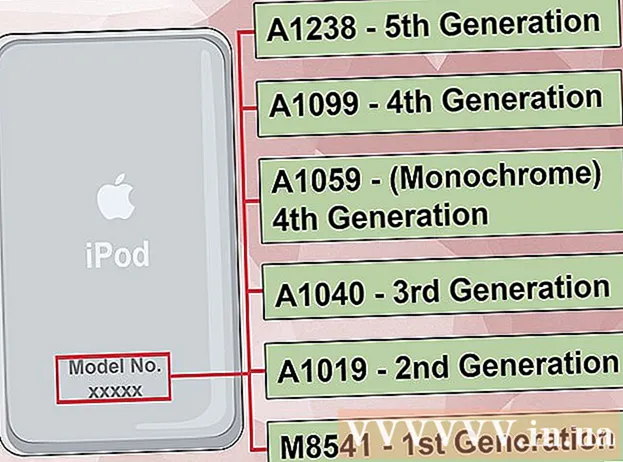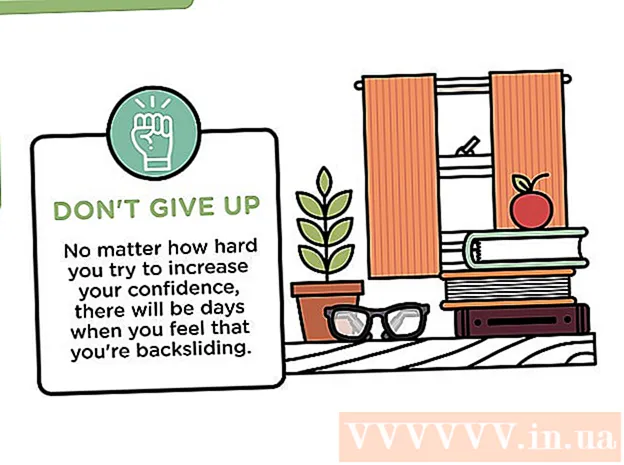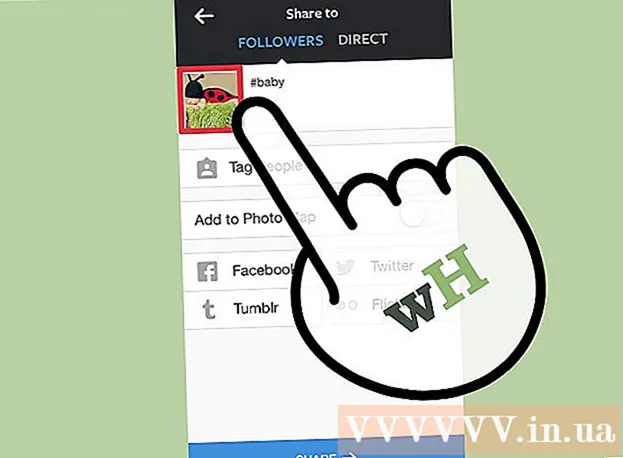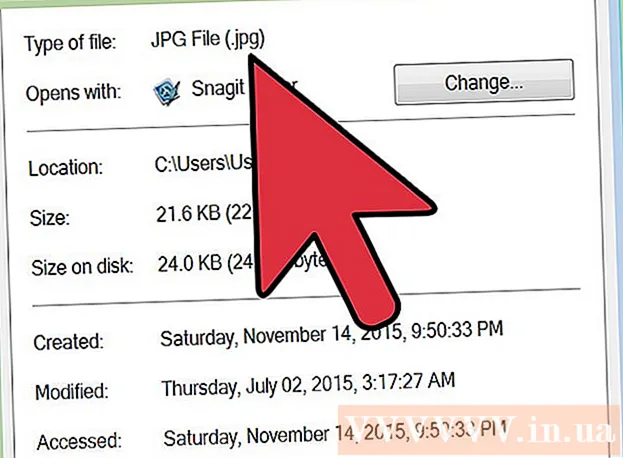
Content
- Steps
- Method 1 of 3: Check the status of your application
- Method 2 of 3: Write a Thank You Letter After Your Interview
- Method 3 of 3: Write a follow-up letter if there is no response
- Tips
- Warnings
Waiting for a response after submitting an application or interview can be frustrating as the job seeker wants to understand how he coped and what the employer thinks of him. The right approach to communicating with the company will help you stand out from the competition. The return emails should be viewed as an additional opportunity to express interest in the position and make a good impression. If you behave like a professional and do not act intrusively, the employer will surely appreciate your efforts and desire to get the position.
Steps
Method 1 of 3: Check the status of your application
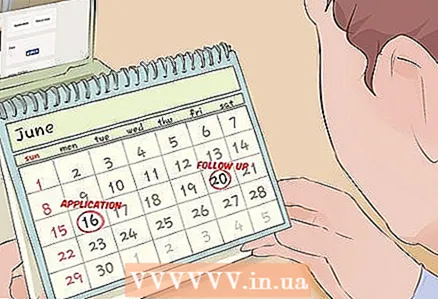 1 Wait at least a few days. There is no consensus on the waiting time after submitting the application, but it is generally accepted that you should wait at least 3-5 days.
1 Wait at least a few days. There is no consensus on the waiting time after submitting the application, but it is generally accepted that you should wait at least 3-5 days. - In fact, some hiring professionals say they would rather not receive any follow-up emails at all. They believe that this tactic is designed to attract attention and only takes the time it takes to select qualified candidates. However, others say that a follow-up letter will help you stand out in a positive way.
- The main thing is to understand that dozens of applicants can apply for the position together with you, and it takes time to review applications and select candidates. The letter shouldn't show you as an intrusive or impatient person, so don't rush.
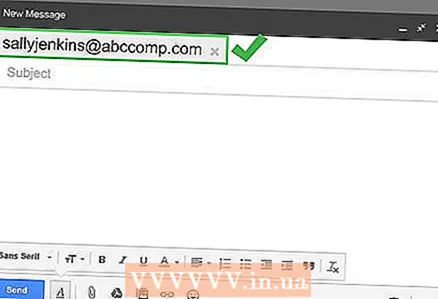 2 Address the letter to the right person. Ideally, the letter should be addressed to the person you approached to apply. If you can't find a name, try Dear Hiring Manager.
2 Address the letter to the right person. Ideally, the letter should be addressed to the person you approached to apply. If you can't find a name, try Dear Hiring Manager. - Often the contact details of the hiring manager can be found on the company's website.
- Always check your spelling. Few things can form a negative impression as quickly as mistakes in a person's name.
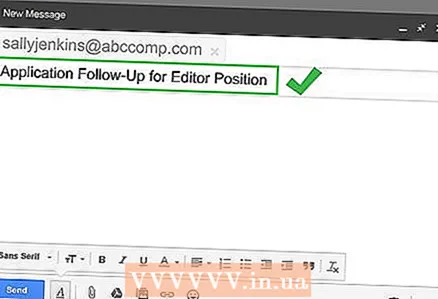 3 State the topic clearly and directly. Use a simple phrase like "Clarification on an application for an editorial position." If you have a cipher of the position you are looking for, you can specify the number in the subject line.
3 State the topic clearly and directly. Use a simple phrase like "Clarification on an application for an editorial position." If you have a cipher of the position you are looking for, you can specify the number in the subject line. - Keep in mind that a hiring manager may be looking for employees for several positions at once, so be very specific.You can even include your name in the subject line so that it doesn't take long to find your application.
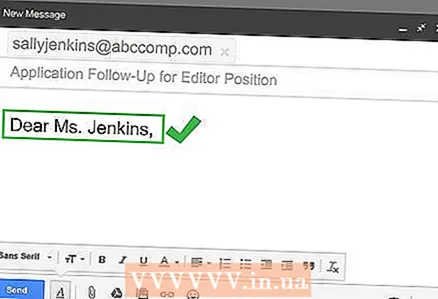 4 Use an appropriate greeting. Just write "Dear" in front of the hiring manager's name as you would in your motivation letter. You should not go for informal messages like "Greetings" or "Hello". At this point, your email should remain businesslike.
4 Use an appropriate greeting. Just write "Dear" in front of the hiring manager's name as you would in your motivation letter. You should not go for informal messages like "Greetings" or "Hello". At this point, your email should remain businesslike. - "Dear Sergei Gennadievich" would be an appropriate greeting.
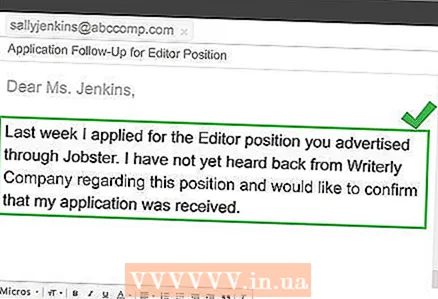 5 Indicate the title and date of application. At the beginning of the letter, indicate when you submitted your application, how you found the vacancy, and also indicate your desire to find out about the status of the application. However, you can add about the desire to make sure that the company received your materials.
5 Indicate the title and date of application. At the beginning of the letter, indicate when you submitted your application, how you found the vacancy, and also indicate your desire to find out about the status of the application. However, you can add about the desire to make sure that the company received your materials. - Just write, for example, “Dear Sergey Gennadievich, last week I applied for the position of editor in response to a vacancy on the Avito website. In the absence of an answer, I would like to make sure that you have received my application. "
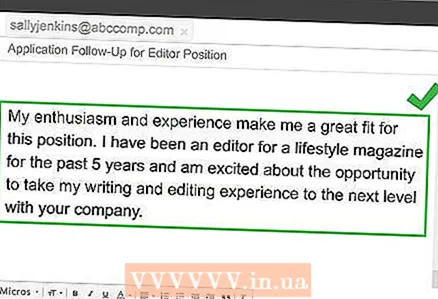 6 Confirm your enthusiasm and qualifications for the position. Tell the hiring manager that you are excited about the opportunity to apply, and also explain why you are a good fit for the position. Please describe your qualifications in detail.
6 Confirm your enthusiasm and qualifications for the position. Tell the hiring manager that you are excited about the opportunity to apply, and also explain why you are a good fit for the position. Please describe your qualifications in detail. - For example: “My enthusiasm and experience make me a suitable candidate. I have been working as an editor of a literary magazine for the last 5 years and I am very glad to have the opportunity to reach a new level together with your company. "
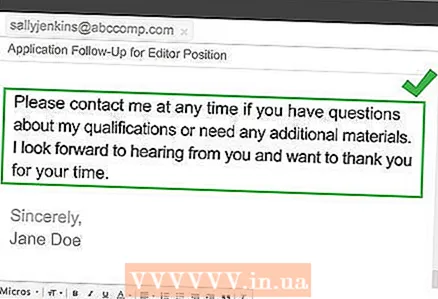 7 End the letter with a short, simple, but enthusiastic phrase. Close your email on a positive note and say that you are looking forward to a quick response. Also offer to resubmit any documents in case the previous submission was not completed correctly. Thank the person for their time.
7 End the letter with a short, simple, but enthusiastic phrase. Close your email on a positive note and say that you are looking forward to a quick response. Also offer to resubmit any documents in case the previous submission was not completed correctly. Thank the person for their time. - For example, “Please contact me if you have any questions about my qualifications or need additional materials. I look forward to your reply and thank you for your time. "
- Sign the letter “Regards, [your name],” and on the next line include your phone number.
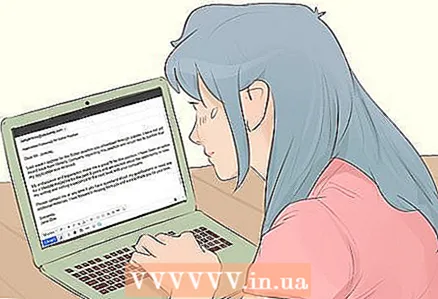 8 Check your draft email before sending. Recheck your spelling and grammar, and evaluate and correct the overall flow of the text. The quality of this letter is just as important as the level of your cover letter and resume, so give the text as much attention as necessary. When you're done, hit the submit button.
8 Check your draft email before sending. Recheck your spelling and grammar, and evaluate and correct the overall flow of the text. The quality of this letter is just as important as the level of your cover letter and resume, so give the text as much attention as necessary. When you're done, hit the submit button. - Read the letter aloud to check that the text is fluent and free of semantic errors.
 9 Be patient while waiting. After sending your email, take a break and just wait. There is no doubt that the persuasiveness of your resume and motivation letter, along with persistence, will help you get an interview.
9 Be patient while waiting. After sending your email, take a break and just wait. There is no doubt that the persuasiveness of your resume and motivation letter, along with persistence, will help you get an interview. - People are often tempted to clarify information over the phone, but you should wait patiently for an answer before taking this step. A phone call can not only show your desire for a job, but it can also be perceived as being overly intrusive.
- If you do decide to call, try to speak with confidence and courtesy, and also remind you of what makes you the right candidate for the position.
Method 2 of 3: Write a Thank You Letter After Your Interview
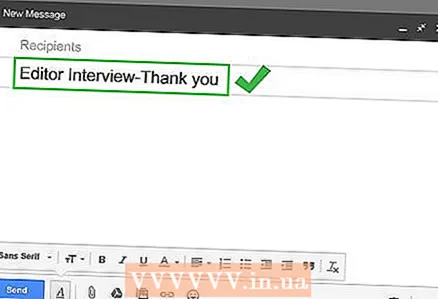 1 Start with a clear and direct subject line. A hiring manager can receive hundreds of emails a day. To stand out in a stream of emails and grab a person's attention, use a literate, direct subject line.
1 Start with a clear and direct subject line. A hiring manager can receive hundreds of emails a day. To stand out in a stream of emails and grab a person's attention, use a literate, direct subject line. - Write “Editor Interview - Acknowledgment”. If you have a code for the title, you can specify the number in the subject line.
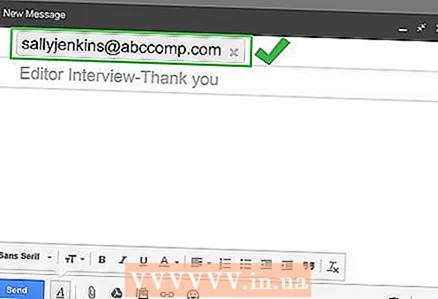 2 Address the letter to the right person. The letter should be addressed to the person or people who interviewed. If you don't remember all the names, try to remember at least the name of the main hiring manager. If in doubt, take a look at the company's website or simply call the reception and ask for more information.
2 Address the letter to the right person. The letter should be addressed to the person or people who interviewed. If you don't remember all the names, try to remember at least the name of the main hiring manager. If in doubt, take a look at the company's website or simply call the reception and ask for more information. 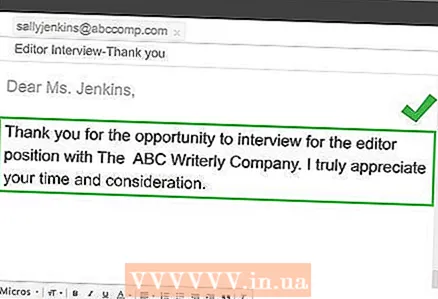 3 Thank the person for their time with sincere and specific phrases. Specify a specific job title, or even the time and date of the interview, to make it easier for someone who has a lot of these meetings.
3 Thank the person for their time with sincere and specific phrases. Specify a specific job title, or even the time and date of the interview, to make it easier for someone who has a lot of these meetings. - Do not limit yourself to the words "Thank you for your time." Better to write “Thank you for the opportunity to be interviewed for the position of editor at Literatura magazine. I sincerely appreciate your time and attention. "
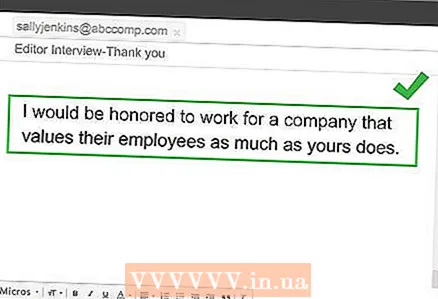 4 Express your enthusiasm for the job and the company. Tell us what you like about the company. Is the mission of the company close to you? Is this a local business? Is the company a technology innovator? Tell me what exactly you paid attention to.
4 Express your enthusiasm for the job and the company. Tell us what you like about the company. Is the mission of the company close to you? Is this a local business? Is the company a technology innovator? Tell me what exactly you paid attention to. - You could write "I know of only a few equally innovative companies in which I could develop my career in this industry."
- “It will be an honor for me to work for a company that values its people so highly.”
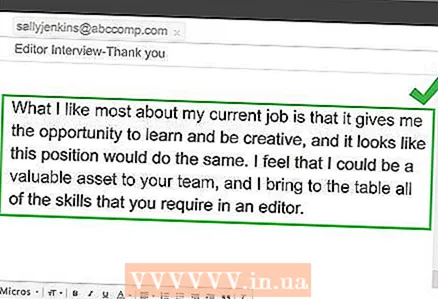 5 Re-emphasize why you are the best fit for the job. If necessary, you can reread the job description in the ad to highlight the qualities and skills the employer needs. If the ideal candidate is to have strong communication skills, then report your communication skills.
5 Re-emphasize why you are the best fit for the job. If necessary, you can reread the job description in the ad to highlight the qualities and skills the employer needs. If the ideal candidate is to have strong communication skills, then report your communication skills. - Typically, employers value reliable, motivated job seekers who are committed to contributing to the company's success. Don't forget to mention this.
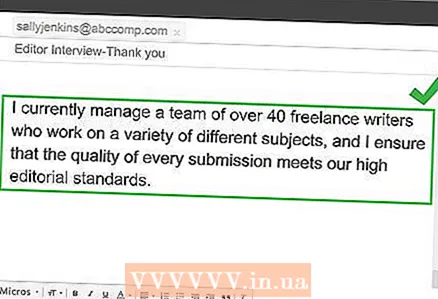 6 Provide information that could not be clarified in the interview. You may have forgotten to mention a significant work experience or situation that best describes you as a candidate for the position. If you have thought of a more detailed answer or explanation for one of the interview questions, then clarify the details.
6 Provide information that could not be clarified in the interview. You may have forgotten to mention a significant work experience or situation that best describes you as a candidate for the position. If you have thought of a more detailed answer or explanation for one of the interview questions, then clarify the details. 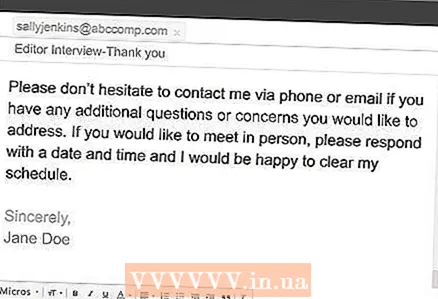 7 Give the employer the opportunity to ask you clarifying questions. In the closing lines, indicate that you are ready to discuss any possible questions or concerns that may arise.
7 Give the employer the opportunity to ask you clarifying questions. In the closing lines, indicate that you are ready to discuss any possible questions or concerns that may arise. - For example, “Please contact me by phone or email if you have any additional questions or concerns that you would like to discuss. If you need a personal meeting, please inform me of the date and time, so that I will free this day from other matters. "
- Do not forget to include your phone number at the end of the letter for easy communication.
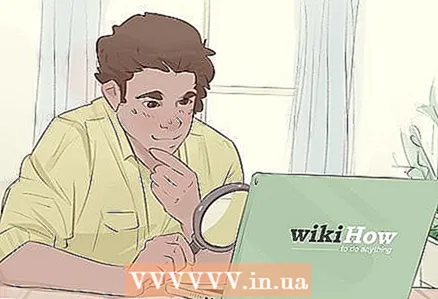 8 Read the letter carefully. After completing the text, take a short break and return to the letter again. Reread the text carefully to look for possible errors or automatic corrections. Also check the overall flow of your writing.
8 Read the letter carefully. After completing the text, take a short break and return to the letter again. Reread the text carefully to look for possible errors or automatic corrections. Also check the overall flow of your writing. - Remember that you are still trying to make a good impression, so the letter must be written at a high level.
- Read the letter aloud to make sure it is fluent and free of semantic errors, and to ensure that the letter is written in an encouraging and polite tone.
 9 Send an email to the people interviewing within 24 hours. During this time, the interview will still be fresh in the minds of all participants. Timely gratitude will show the hiring manager your desire for the position and help them remember you better.
9 Send an email to the people interviewing within 24 hours. During this time, the interview will still be fresh in the minds of all participants. Timely gratitude will show the hiring manager your desire for the position and help them remember you better.
Method 3 of 3: Write a follow-up letter if there is no response
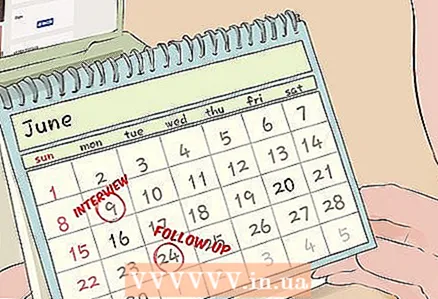 1 Wait for the specified time before writing another letter. If the employer has indicated that it hopes to make a decision within a week, then the letter should be sent after seven days. If it was about two weeks, then wait at least fourteen days.
1 Wait for the specified time before writing another letter. If the employer has indicated that it hopes to make a decision within a week, then the letter should be sent after seven days. If it was about two weeks, then wait at least fourteen days. - Take your time so as not to come across as an intrusive or impatient person. It may turn out that the manager has conducted several interviews for different positions and needs time to process the information.
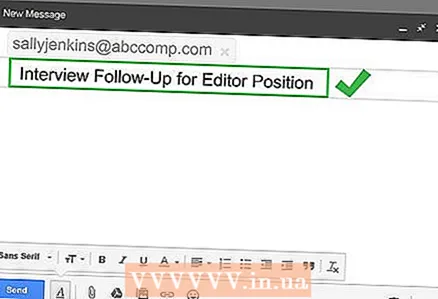 2 State the topic clearly and directly. By this point, the hiring manager and assistants may have had many other interviews, so it's important to be as specific as possible. You can even enter your name in the subject field to make it easier to find your application.
2 State the topic clearly and directly. By this point, the hiring manager and assistants may have had many other interviews, so it's important to be as specific as possible. You can even enter your name in the subject field to make it easier to find your application. - For example, you can specify "Clarification on the interview for the position of the editor" or "Interview question from 06/12/2018, Olga Ivanova."If you have a cipher of the position you are looking for, you can specify the number in the subject line.
- You can reply to the previous letter. A "Re:" in front of the subject line will indicate which issue the message is related to and can speed up the reading process.
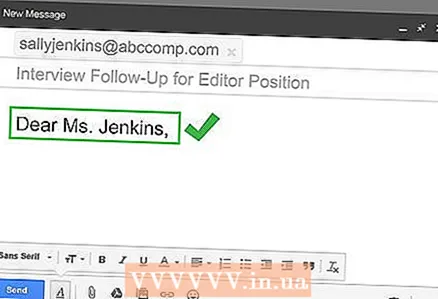 3 Address the letter to the person with whom you spoke earlier. If you could not find the names of all the people who interviewed, then address the letter to the people to whom you wrote a thank you letter.
3 Address the letter to the person with whom you spoke earlier. If you could not find the names of all the people who interviewed, then address the letter to the people to whom you wrote a thank you letter. 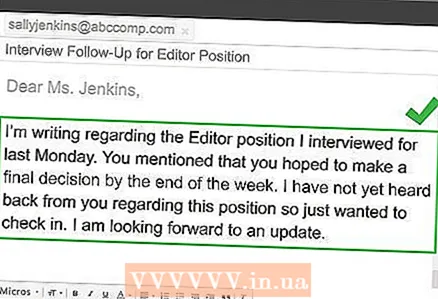 4 List the position for which you were interviewed, and also indicate that you are still interested in the job. Keep your thoughts short and simple. Also include the date of the interview and the name of the hiring manager in charge. Remember to say that you have not yet been contacted regarding the company's response.
4 List the position for which you were interviewed, and also indicate that you are still interested in the job. Keep your thoughts short and simple. Also include the date of the interview and the name of the hiring manager in charge. Remember to say that you have not yet been contacted regarding the company's response. - For example, “I am writing to you regarding the editorial interview I had last Monday. You mentioned that you intend to make a final decision before the end of the week. Since then, no one has contacted me, so I would like to clarify this point. I really hope for your answer. "
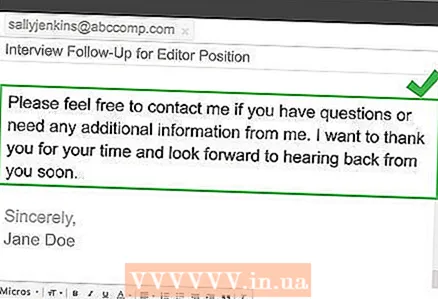 5 End the letter on a positive note. At the end, let us know that you hope for a quick response. You can also remind your contact information and offer to contact you if you have any additional questions. Keep it short and simple, but show that you want the position.
5 End the letter on a positive note. At the end, let us know that you hope for a quick response. You can also remind your contact information and offer to contact you if you have any additional questions. Keep it short and simple, but show that you want the position. - “Please contact me if you have any questions or need additional information. Thank you for your time and hope for a quick response. "
- Close the letter with the words "Regards, [your name]."
 6 Reread and edit your draft letter. After completing the text, take a short break and return to the letter again. Reread the text carefully to find possible mistakes and correct the overall flow of the letter.
6 Reread and edit your draft letter. After completing the text, take a short break and return to the letter again. Reread the text carefully to find possible mistakes and correct the overall flow of the letter. - Read the letter aloud to make sure the text is written in a polite and professional manner, without semantic errors or cumbersome phrases.
 7 Please be patient and wait for an answer. At this stage, it should be acknowledged that you have done your best to secure the position. You submitted a compelling application, completed an interview, and wrote a follow-up letter.
7 Please be patient and wait for an answer. At this stage, it should be acknowledged that you have done your best to secure the position. You submitted a compelling application, completed an interview, and wrote a follow-up letter. - Don't be discouraged if you don't get an answer right away. It may take a while for the hiring manager to complete all interviews and contact the applicants.

Shannon O'Brien, MA, EdM
Personal and Career Coach Shannon O'Brien is the Founder and Principal Consultant of Whole U., a career and personal counseling service in Boston, Massachusetts. Through counseling, workshops and e-learning, Whole U. helps people find their dream job and live balanced, meaningful lives. Shannon has been named the number 1 career and personal trainer in Boston, Massachusetts based on reviews on Yelp. Her work has been featured on Boston.com, Boldfacers and UR Business Network. He holds an MSc in Technology, Innovation and Education from Harvard University. Shannon O'Brien, MA, EdM
Shannon O'Brien, MA, EdM
Personal and career coachHow to write a follow-up letter so as not to come across as an intrusive person? Clarification in itself is not overly intrusive. Life and work can be stressful and chaotic at times, which is why hiring managers often need a reminder. You are doing them a favor with your business letter. People should change the way they think about follow-up letters.
Tips
- Even if you were not hired, you can still stay in touch. Add such an employer to your contact list to expand your business dating list.
- Keep in mind that the hiring manager may be busy with other things in addition to processing your application. Remember to be respectful and write succinctly for effective communication.
Warnings
- Consider what your email address has to say about you.Do not use personal mail with an inappropriate address like "krasavchik666" or "ryzhayabestiya" for business correspondence. Better to create another account with your own name or a more business address.
- Never act intrusive, demanding, or arrogant. Do not be rude to the manager, because he has to make the final decision. He understands that you want to get a job, but you are only one candidate out of a hundred, so rudeness and obsession will only make a negative impression.
